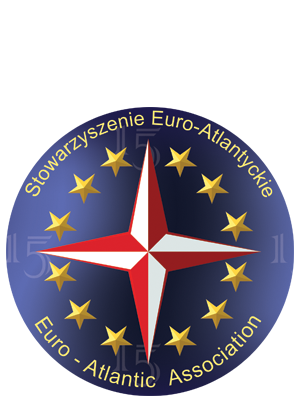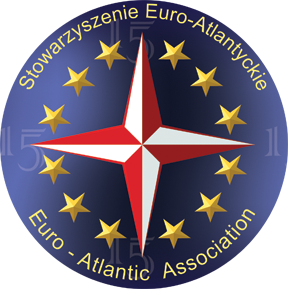US – POLAND – EU RELATIONS REPORT
On September 11, 2019 Euro-Atlantic Association and Conference of Ambassadors, supported by the Representation of the European Commission in Warsaw, held the conference “Time for reactivation. US – Poland – EU”.
Introductory Note
Today’s political, economic and social problems overshadow the fact that, after the fall of communism in Central-Eastern Europe, the United States, European Union and Poland enjoyed a long period of effective co-operation, relative stability, economic growth and social progress. In 1999 Poland joined NATO and soon, in 2004, became a member of the European Union. During those years the transatlantic alliance for all participants, US, EU and Poland, constituted indisputable pillar for democracy, development and security.
This is the past time. Nowadays we live the moments of uncertainty and unpredictability. The least expression made a true world career. Growing populism, nationalism, economic rivalry and divergencies over the common values put the transatlantic community on the brink of collapse. Since 2016, the United States and Poland are living a new political reality. Personalized by their leaders, both countries – despite the formal declarations – adopted critical and sometimes even hostile position towards the EU – the most important sphere of Poland’s activity, and the only real ally of the United States in challenging times. Steadfast and ironclad, based upon common interest and values, Euro-Atlantic co-operation is not obvious anymore and frequently questioned. Intents to break up the unity of the European Union, and even NATO are being continued. The shift towards the nationalism, comprehended in foreign affairs as dominance of individual interest over the communitarian one, but also the primacy of internal political straggles over the external issues, led to multiple decisions of interim character, shortsighted and frequently oriented towards propaganda effects only. Currently, both countries, the US and Poland, amid the electoral campaigns, subordinated almost totally their activity on international scene to the expectations of voters.
For the decades the American leaders have been expressing the lack of real, executive partner on the European side. In fact the US administration always preferred the bilateral communication format rather than dealing with the communitarian institutions.
The European elections and appointment of new EU authorities this year create, at least theoretically, a fresh perspective, which may give a chance to improve EU – US relations. It is dependent however of the electoral rhetoric of president Donald Trump who may respond again to the call for “America First”.
- Historical and contemporary context
In the most critical moments of our history the relations between the United States and Europe, Poland included, played a crucial role. During world war 1 and world war 2, “cold war” and collapse of the Soviet Union, the alliance of “western” forces on both sides of the Atlantic Ocean became a game changer, not only in military sense, but also building up the economic stability and social progress. In the recent past practically all US presidents used to confirm the unity of Western World, perceived as the area of democracy, free market and social prosperity. Some politicians called it the community of values and interests. This was the way the US leaders, such as Woodrow Wilson, Franklin D. Roosevelt, Dwight Eisenhower, Jimi Carter, Ronald Reagan, George W.H. Bush, Bill Clinton or Barack Obama, regardless their political affiliation, thought and acted. In case of Poland, all post-transformation forces after 1989 considered the western alliance as the fundamental pillar for Poland’s sovereignty, security and development. Strong, if not vital ties between allies, do not change the fact that there were sporadically discrepancies or even conflicts. The common interest and values however, prevailed.
- During the post-war period US – Europe relations have been based upon the convincing premise of superiority of democratic system, with its fundamental role of individual freedom, right to choose, rule of law and free market economy, over the authoritarian model, built upon primacy of leader’s ideas and ruling party over the state institutions and people’s will. Western, liberal democracy, with its long experience in fulfilling social and individual expectations, looked stable and promising despite sporadic outbursts of nationalism and hard hand solutions.
- This time is seems to be over. Current problems with economic stability, growing social gap and massive migrations provoked the rise of national egoism, racism and isolationism. The authoritarian systems moreover are trying to prove their higher effectiveness in solving people’s everyday problems, offering simple but short term solutions. These factors played an important role in weakening the Western Community ties in all areas, defense and security included.
- 2016 marked a new stage in all three, US – EU, US – Poland and EU – Poland relations. The shift has been originated with the change of political leadership in the United States and Poland, where the ruling party took the path of Hungary, with the intention to install “controlled democracy” along with the party domination over the state institutions and with limited role of civil society. Both concepts, Polish and American, concepts of the country based upon “true, national root”, xenophobic and uniquely self-oriented, formed the pillar of unequal alliance. In this strategic partnership Warsaw begun to play a role of a “Trojan horse” and bad news messenger, particularly within the relations with the European Union. If Poland – confronted with criticism of European institutions and courts – wanted to balance its weakening position in the EU with special alliance with the White House, for president Trump maintaining the hegemonic position in global world and successful reelection, constituted the primary goals.
- US – EU in turbulent times
The European – American relations are focused mostly on two areas: security and economic co-operation in a broad sense. The core issues referring to the world order and global stability remain untouched. A variety of discrepancies though, such as climate changes, migration policy or 2015 Joint Comprehensive Plan of Action agreed with Iran, compose a long, conflictive list.
- Security and defense. In the security area North Atlantic Treaty Organization plays a distinctive, and hitherto successful meeting point for diverse, individual members’ visions and worries. From the very beginning of NATO system, the security of Euro-Atlantic space has been defined as joint defense of sovereign member-states sharing the same values and alike political systems. In 1994, as binding rules for future joining parties, US secretary of defense, William Perry formulated his points. Famous “Perry’s Principles” enumerated civil control over the armed forces, compatibility, consensual co-operation, but also democratic system, protection of minorities, transparent decision making process and rule of law as the most important and indispensable conditions for aspiring countries. Today we may say: if, in the past, these principles had been sometimes neglected or omitted, nowadays they barely exist.
- Until recently the unity and key role of North Atlantic Alliance in European and American security has never been undermined nor underestimated. It is noteworthy to remind that first and the only use of Treaty’s Article 5 happened after the terrorist attack on World Trade Center towers on September 11, 2001. On the other hand a damaging critic from among the member-states came right from the US president. It has been directed towards the military spending level by some of the NATO members. Nevertheless, the thorough and profound analysis presented last year by the Center of Strategic and International Studies (CSIS), one of the most serious and reliable US think tanks, demonstrates that expected 2% defense budget does not necessarily fulfill the need for effectiveness and compatibility. In some NATO countries, Poland among them, the expenditures on bureaucracy, current services (e.g. VIP flights) and promotion (TV, street banners, internet spots) were on rise, while the most instrumental elements of NATO strength: modernization, joint drills and foreign missions, are located in a very distant place of budgetary planning.
- Economic relations. Current international developments point out that the world is entering a new stage of rivalry for global hegemony. The United States perceives China as the main adversary, mostly in the field of trade and new technologies, but also on military ground. In this confrontation Russian Federation remains merely as an object of political game with no predictable outcome. The EU is still number one commercial partner of the United States but – in the view of some Washingtonian political architects – the role of the European Union in this contemporary race, supportive and based on partnership until now, should get shrunk and be limited essentially to the execution of decisions masterminded in the White House. Deal oriented strategy of Donald Trump made the commercial exchange between EU and US tremble. Instead of tightening transatlantic economic bonds, e.g. continuing TTIP negotiations until their successful end, which should be a natural remedy for difficult times, the trade conditions have gotten worst. Negotiations are being replaced with pressure instruments, such as rise of tariffs.
- Poland – US: a Grey Zone
The US – Poland relations have been shaped by history and geopolitical position of the latter. The location on the eastern flank of EU and NATO made Warsaw more responsive and co-operative with its oversees ally – unquestionable, biggest military force within western structures and even globally.
- Given a relatively modest European engagement in building up a joint EU defense structures, the United States is perceived by Poland as the sole real power capable and ready to act in case of external jeopardy. Paradoxically, the gradual broadening of a conflictive space between Brussels and Warsaw enhance the strengthening of US – Poland rapprochement. Close or even exceptionally close contacts between ruling in Poland Law and Justice Party (PiS) and the Trump administration are treated as an effective remedy for EU criticism towards ongoing curbing of civil rights and the European Tribunal’s cases against breaking down the constitutional order in Poland. According to many government right wing followers, friendly relations between Washington and Warsaw form a convincing proof that PiS has never abandoned pro-western position, still remains in the core of transatlantic alliance and has just selected a better, more pragmatic stance. For President Trump, on the other hand, Poland offers a friendly, supportive ambience for his visits and good, hungry customer behavior. Additionally, Warsaw is the source of doubts and critics towards the EU, which go along the lines of the White House position.
- Historically the US – Poland relations has never been balanced and it is right to underline that they could have not been different, given the numbers in population, economic development or military strength. At the same time they have never been so visibly shortsighted, theatrical and politically inner-oriented, without care for long term perspective and unity of Poland’s alliances in a broader sense. Among many opposition experts the current US – Poland relations are denominated as clientelist and transactional.
- Diplomatically speaking the Washington – Warsaw alliance is “unilaterally leaned”. If the strengthening of American military presence or some defense equipment purchases should be considered as positive decisions, the one-sided method used and distancing from common EU foreign, migration and defense policies constitute for Poland a dangerous and risky step toward nobody’s space, a mythic “grey area”, which no one takes care of.
- Reactivation vs. Retraction
“America needs Europe as much as Europe needs America” – this opinion is still popular on both sides of the Atlantic Ocean. Nevertheless the current everyday practice seems to contradict what many American and European experts consider obvious. To blame only some leaders for their political temperament is not satisfactory. The majority of European leaders, referring to the ideals and actions of Trump’s America, adopted position of a patient spouse who calmly waits until the partner grows up or leaves. This method has been effectively tested during G7 Summit in Biarritz which initially, following the Canadian experience a year ago, looked like another faze of battle against multilateralism and lost opportunity to get agreed on most challenging issues: economy and environment. Efforts made by French President Emmanuel Macron brought some results. In great part thanks to his personal skills.
- This year European Union elected its Parliament and is about to approve the European Commission team. Former German defense minister, Mrs. Ursula von der Leyen became a president of the EU government. Experience, dynamism, patience, but at the same time, determination and perseverance are the strong points of this new European leadership. It gives a chance and hope simultaneously that, even under unfriendly circumstances, the Transatlantic Alliance will survive and perhaps reactivate.
- Good co-operation between partners requires basic, mutual knowledge and understanding. For many US citizens the concept of European Union remains unclear or even unknown. Overwhelming majority of American people automatically compare their own country construction with the “European device”. Big part of them come to the conclusion that EU is a badly done copy of what the Founding Fathers invented almost 250 years ago. Many languages, semi-borders dividing the continent, several currencies with one dominating, mixed, national and communitarian powers, all that makes many Americans feel distant to the EU concept and its policies. Multiple media and even politicians share this sort of perception. For above mentioned reasons it is of an upmost importance to dedicate more efforts to promote and teach Schuman’s ideas and the real role of European Union in US and global politics. Lectures, debates, festivals at the universities, particularly the local ones, think tanks and cultural centers should be the first targets.
- Many years ago Henry Kissinger asked for a right telephone number to Europe. The question reflected the American expectation for “one voice” position and effectiveness in action. This demand is still in good standing. Strengthening and shortening at the same time the decision making process may appear challenging but also rewa The new EU leadership, confronting the Shakespearean dilemma “to be or not to be”, can do a lot to improve Community’s performance and present the European institutions to the US public and the whole world as strong and representing united Europe. There is no doubt whatsoever that America, the American people, regardless its future political leadership, will respect and cheer expressiveness and executive discipline of renewed European institutions, but also assertiveness in safeguarding the rule of law, tolerance and security.
Author: Ryszard Schnepf – former Secretary of State at the Chancellery of the Prime Minister and Ministry of Foreign Affairs, former ambassador to Spain and USA.






Sorry, the comment form is closed at this time.